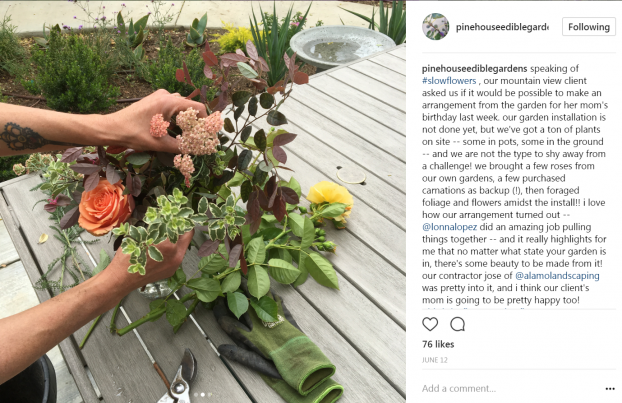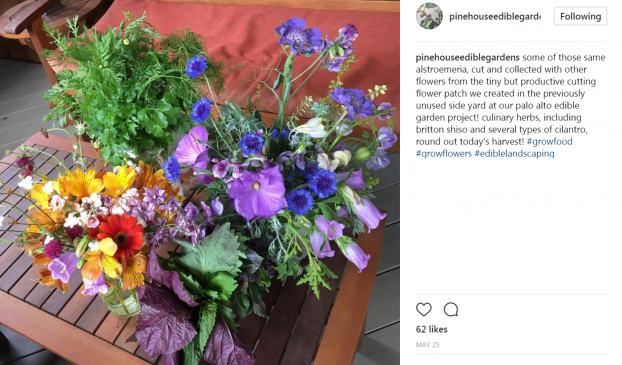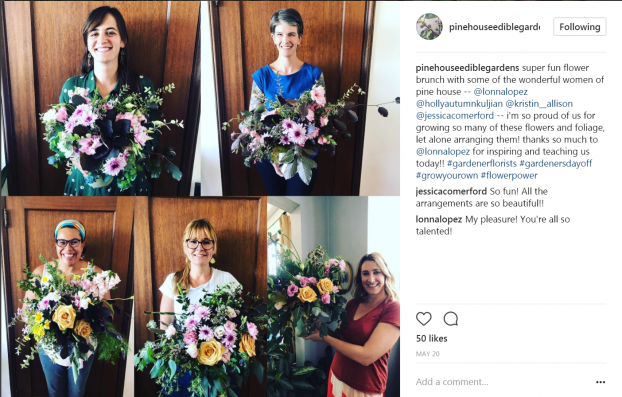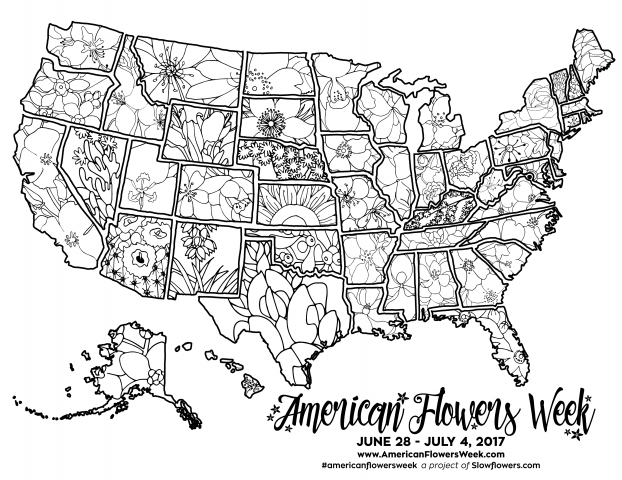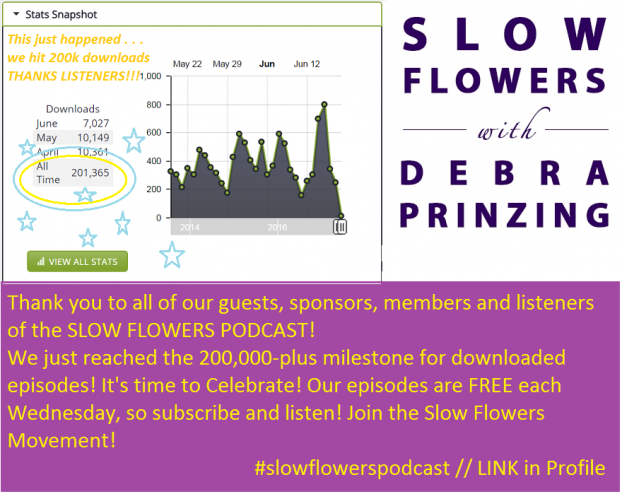Podcast: Play in new window | Download
Subscribe: Apple Podcasts | Podcast Index | RSS | More
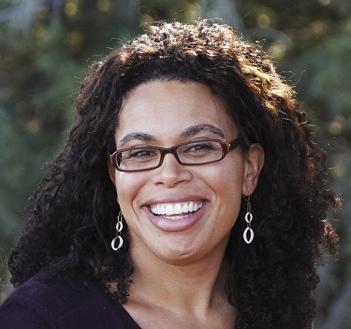 Today I’m excited to introduce you to Leslie Bennett, an Oakland-based landscape designer specializing in aesthetically pleasing food-centric gardens. Leslie is the owner of Pine House Edible Gardens, which designs, installs and maintains delicious gardens for private & community clients in the Bay Area.
Today I’m excited to introduce you to Leslie Bennett, an Oakland-based landscape designer specializing in aesthetically pleasing food-centric gardens. Leslie is the owner of Pine House Edible Gardens, which designs, installs and maintains delicious gardens for private & community clients in the Bay Area.
We’ve been friends for a number of years and it is my pleasure to share a recent conversation we recorded for today’s podcast. Consider this a preview of Leslie’s participation as a Slow Flowers Summit speaker.
She will be one of four panelists who will share insights and perspective during the Inclusion/Diversity dialogue led by Chantal Aida Gordon of TheHorticult Blog, last week’s guest. These two women will be joined by Nicole Cordier Wahlquist of Grace Flowers Hawaii and Riz Reyes of RHR Horticulture. Together, these innovators and creatives are telling a narrative that we can all benefit from, especially as we desire more meaningful, authentic and ethical lives.
I’ve had the privilege of interviewing Leslie about her design work for a number or articles, including a Los Angeles Times piece.
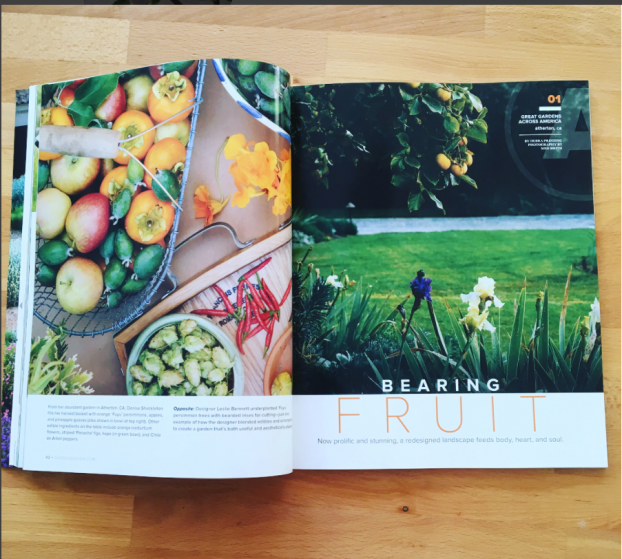
The Summer issue of Garden Design magazine features an extensive spread about Leslie’s edible-ornamental design for a Bay Area family.
This summer, you can find two beautiful and informative stories about Leslie’s projects that I was honored to write — one appears in the SUMMER Issue of Garden Design, called “Bearing Fruit,” about a landscape in Atherton, California, part of the magazine’s Great Gardens Across America series, and the other appears in the July issue of Better Homes & Gardens, on newsstands this week, called “Dyed & True,” about an urban backyard filled with plants that produce textile pigments, which Leslie designed for her Berkeley clients.
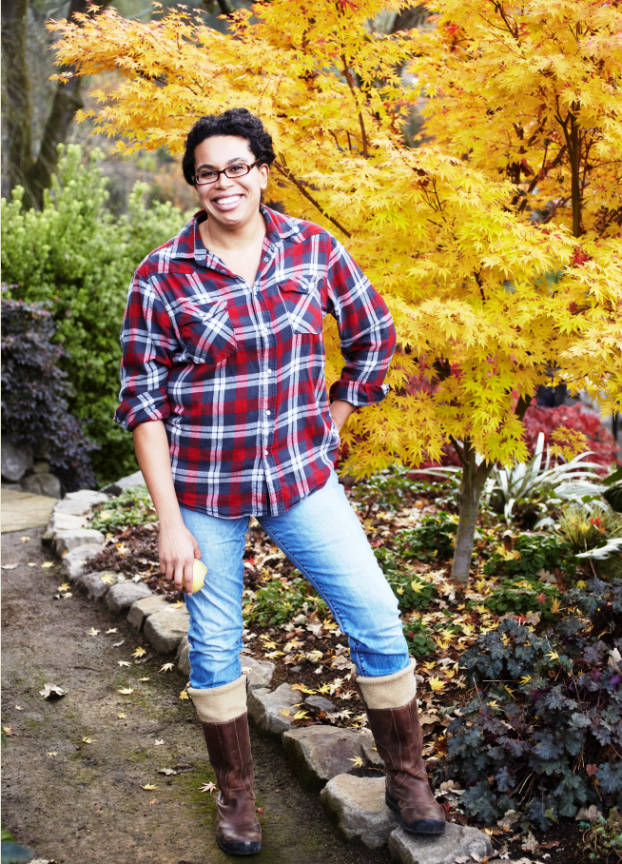
Leslie Bennett forged a holistic life for herself as a garden designer, speaker, author and advocate for edible landscapes.
There was a portion of one of my interviews with Leslie that landed on the cutting room floor, thanks to an editor’s space crunching tendencies, but it is too fabulous not to share it here. I think this will help introduce Leslie to you and give you insights into what makes her tick as a creative individual:
Leslie Bennett trained as a lawyer and turned her professional life upside down to learn organic food farming, emerging a landscape designer who specializes in stylish edible gardens.
With several years of experience in other horticulture and design ventures, she launched Pine House Edible Gardens in 2015. Growing food originally influenced Leslie’s search for a connection with the land, one that led her away from corporate law to study permaculture in the U.K. and work on a series of organic food and biodynamic farms in Jamaica and Northern California.
“I loved growing food, but I rejected the idea that it had to be strictly utilitarian,” Leslie recalls. “I remember wondering where the beauty was. It seemed like the organic movement sometimes rejected frivolous things like incorporating beauty alongside food production. One afternoon in the bean fields, I realized, ‘I’m not into this. This reminds me of my law firm,’ so I put a stop to that and started doing what I wanted to do.”
Since leaving row crops behind, Leslie has pursued edible and ornamental harmony in her design work. Her enthusiasm is contagious, attracting clients who yearn for the bountiful environments she helps them attain.
“I’m motivated by making a space meaningful for those who live there,” she says.
 You’ll love hearing from Leslie in today’s episode and if you’re heading to Seattle for the Slow Flowers Summit on July 2nd, you’ll love meeting her in person. Our event bookseller will have copies of The Beautiful, Edible Garden (Ten Speed Press, 2013), a guide to incorporating edibles into the ornamental landscape, of which Leslie is a co-author, and she’ll be signing copies after her presentation.
You’ll love hearing from Leslie in today’s episode and if you’re heading to Seattle for the Slow Flowers Summit on July 2nd, you’ll love meeting her in person. Our event bookseller will have copies of The Beautiful, Edible Garden (Ten Speed Press, 2013), a guide to incorporating edibles into the ornamental landscape, of which Leslie is a co-author, and she’ll be signing copies after her presentation.
And if you follow Leslie’s Instagram feed @pinehouseediblegardens, you will soon realize she is as much a floral designer as a foodie. Her landscapes are filled with useful and beautiful plants to harvest, not just for the body but for the eyes and soul. Leslie makes it a practice to give her clients cutting garden options in all four seasons; I wish more landscape designers took this approach and I love that her firm is showing the way.
Here’s how you can find Leslie at her social places.
Pine House Edible Gardens on Facebook
Pine House Edible Gardens on Instagram
Pine House Edible Gardens on Twitter
American Flowers Week launches one week from today on June 28th — and it’s not too late to jump onboard and use this social media and promotional campaign to put you and your local flowers on the map! You can check out americanflowersweek.com for all the cool details, including our just-released Coloring Map of the USA with every state flower designed by Jenny Diaz.
This is free for you to download, print and share with clients and customers this month. Feel free to add your own logo to the PDFs and get promoting! And I’d love to see your finished pages — when you post use #americanflowersweek. Please join in and help spread the word — let’s get trending on Twitter, Instagram and other social platforms!
 The Slow Flowers Summit is one of our major events that will take place during American Flowers Week and you’ve heard me talking about it for quite a while. I really can’t believe the day is almost here. We have registrants coming from Georgia, Michigan, Ohio, Arizona, California, Oregon, Iowa, Alaska and, of course, Washington State. I’m blown away by the response from the Slow Flowers Community. We have a limited number of tickets left, so it’s not too late to come to Seattle for a jolt of ideas, inspiration, innovation, instigation and more! Grab your registration tickets here.
The Slow Flowers Summit is one of our major events that will take place during American Flowers Week and you’ve heard me talking about it for quite a while. I really can’t believe the day is almost here. We have registrants coming from Georgia, Michigan, Ohio, Arizona, California, Oregon, Iowa, Alaska and, of course, Washington State. I’m blown away by the response from the Slow Flowers Community. We have a limited number of tickets left, so it’s not too late to come to Seattle for a jolt of ideas, inspiration, innovation, instigation and more! Grab your registration tickets here.
The Slow Flowers Podcast has been downloaded more than 202,000 times by listeners like you. We hit this big milestone earlier in the week — thanks for helping us reach it!
THANK YOU to each one of you for downloading, listening, commenting and sharing. It means so much. If you value the content you receive each week, I invite you to show your thanks and support the Slow Flowers Podcast with a donation — the button can be found on our home page in the right column. Your contributions will help make it possible to transcribe future episodes of the Podcast.
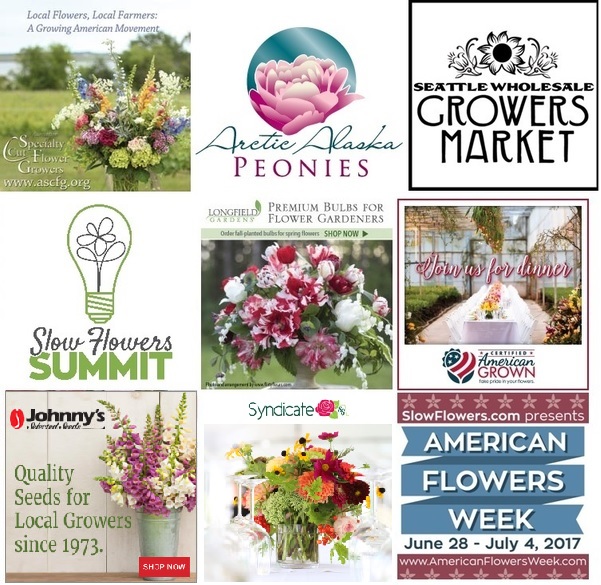 Thank you to family of sponsors:
Thank you to family of sponsors:
Certified American Grown Flowers. The Certified American-Grown program and label provide a guarantee for designers and consumers on the source of their flowers. Take pride in your flowers and buy with confidence, ask for Certified American Grown Flowers. To learn more visit americangrownflowers.org.
Arctic Alaska Peonies, a cooperative of 50 family farms in the heart of Alaska providing high quality, American Grown peony flowers during the months of July and August. Visit them today at arcticalaskapeonies.com
Seattle Wholesale Growers Market, a farmer-owned cooperative committed to providing the very best the Pacific Northwest has to offer in cut flowers, foliage and plants. The Growers Market’s mission is to foster a vibrant marketplace that sustains local flower farms and provides top-quality products and service to the local floral industry. Find them at seattlewholesalegrowersmarket.com
Longfield Gardens provides home gardeners with high quality flower bulbs and perennials. Their online store offers plants for every region and every season, from tulips and daffodils to dahlias, caladiums and amaryllis. Visit them at lfgardens.com.
Syndicate Sales, an American manufacturer of vases and accessories for the professional florist. Look for the American Flag Icon to find Syndicate’s USA-made products and join the Syndicate Stars loyalty program at syndicatesales.com.
Johnny’s Selected Seeds, an employee-owned company that provides our industry the best flower, herb and vegetable seeds — supplied to farms large and small and even backyard cutting gardens like mine. Check them out at johnnysseeds.com.
Association of Specialty Cut Flower Growers. Formed in 1988, ASCFG was created to educate, unite, and support commercial cut flower growers. It mission is to help growers produce high-quality floral material, and to foster and promote the local availability of that product. Learn more at ascfg.org
I’m Debra Prinzing, host and producer of the Slow Flowers Podcast. Next week, you’re invited to join me in putting more American grown flowers on the table, one vase at a time. And If you like what you hear, please consider logging onto Itunes and posting a listener review.
The content and opinions expressed here are either mine alone or those of my guests alone, independent of any podcast sponsor or other person, company or organization.
The Slow Flowers Podcast is engineered and edited by Andrew Brenlan. Learn more about his work at KineticTreeFitness.com.









